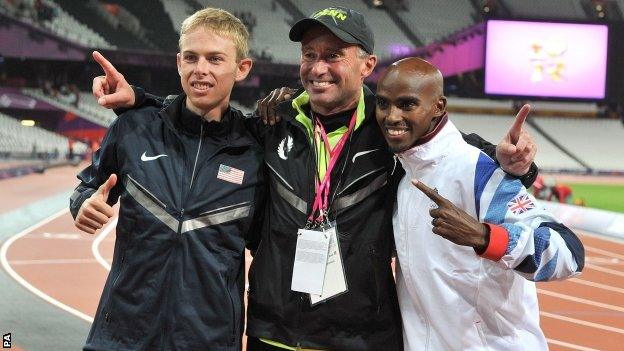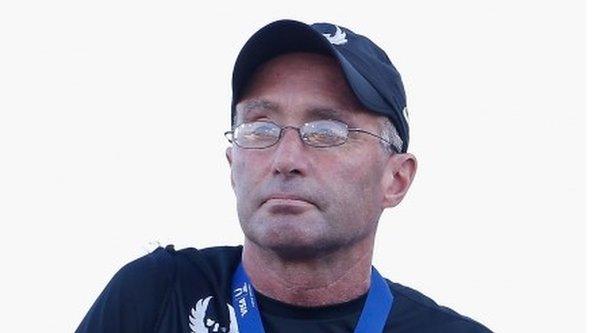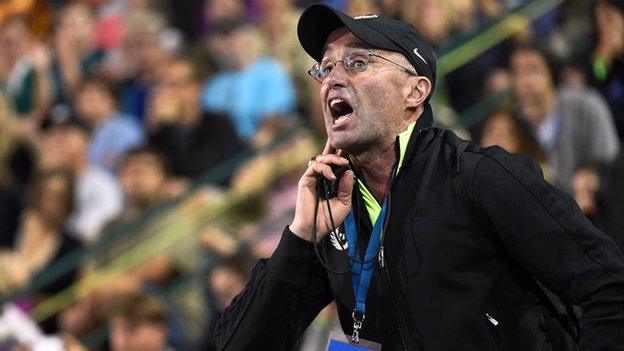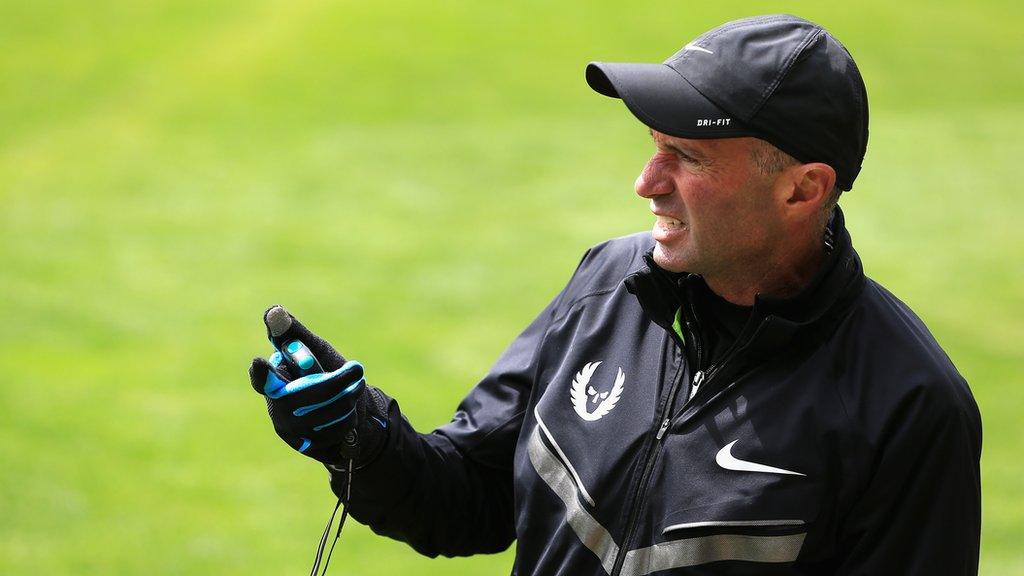Mo Farah to keep Alberto Salazar as coach
- Published

Rupp (left) and Farah (right) have both given their backing to under-pressure coach Salazar
Britain's double Olympic champion Mo Farah has announced he will continue to work with his coach Alberto Salazar.
On Wednesday, Salazar denied at length that he had violated anti-doping rules.
"As someone I've worked with for many years, I feel I have to believe in Alberto and the evidence he has provided," said distance runner Farah.
"Based on that evidence, I'll continue to work with him and hope now that I can focus on what I do best - training hard to win medals for my country."
UK Athletics chief executive Niels de Vos said: "British Athletics notes and respects Mo Farah's decision to continue his coaching relationship with Alberto Salazar.
'The Salazar response: What questions remain?' Read more from BBC Scotland's Mark Daly.
"As is normal at this time of the year Mo is currently training at altitude under the guidance of British Athletics as he prepares for the August defence of his world titles in Beijing.
"As has always been the case, British Athletics will continue to take responsibility for all nutritional, medical and sport science elements of Mo Farah's training regime."
Who is Alberto Salazar? |
|---|
Age: 56 |
Born: Havana, Cuba (emigrated to US as a child) |
Achievements: Three-time New York Marathon winner (1980, 1981, 1982), Boston Marathon winner (1982), US Outdoor Track & Field 10,000m champion (1981, 1983), US Cross Country Champion (1979), National Distance Runner's Hall of Fame inductee (2000), represented US at 1984 Olympics in LA |
UK Athletics has ordered an independent review into the matter, which will conclude in early August.
There is no suggestion that world and Olympic 5,000m and 10,000m champion Farah, who is part of the 56-year-old's Nike Oregon Project training operation, has broken any rules.
Farah's American training partner Galen Rupp said earlier he was backing Salazar "100%" despite allegations the coach practised doping techniques on him as a teenager.
Rupp, the 2012 Olympic 10,000m silver medallist behind Farah, spoke after winning his seventh consecutive United States title over the distance on Thursday, which secured his place at the World Championships in Beijing in August.
Galen Rupp says he is '100% behind' coach Alberto Salazar
The 29-year-old said he thought "the truth would prevail", adding it had been "difficult to focus" following allegations - made in a BBC documentary in collaboration with US journalism website ProPublica - that Salazar violated various anti-doping rules and used testosterone medication on a 16-year-old Rupp in 2002.
The BBC understands Salazar is being investigated by the US Anti-Doping Agency (Usada) to determine whether anti-doping rules may have been violated.
Both Salazar and Rupp deny all the allegations.
On Wednesday, Salazar issued a 12,000-word rebuttal, backed by emails and other documents, saying he "will never permit doping" at his NOP training base.
Salazar's former assistant, Steve Magness, said the American coach's lengthy response, external to claims in the BBC investigation "reeks of desperation".
Magness' allegation of being in Salazar's office when he was handed a report showing Rupp was on "testosterone medication" was one of several key claims made in the BBC documentary.
Steve Magness: "Some of the allegations struck me pretty hard"
In Salazar's denial he said Magness' contract was terminated because he "proved to be a poor coach who had difficulty building rapport with world-class athletes".
Magness described Salazar's rebuttal as "disheartening" and "saddening".
"I know what happens to whistleblowers, I know they get attacked," Magness told the BBC.
Salazar admitted claims he used a testosterone gel on his sons to see how much would trigger a positive test, but said this was an experiment to combat "sabotage", set up by a doctor, Jeffrey Brown.
But Brown told ProPublica, external he "absolutely" was not involved in any experiment and that he advised Salazar on a "hypothetical situation".
High-profile US distance runners and former NOP athletes Kara and Adam Goucher also made claims about Salazar's alleged abuse of Therapeutic Use Exemptions (TUEs) in 2007 and 2011.
Kara Goucher said: "Unfortunately, Alberto's false statements and one-sided, partial stories don't tell the truth. Adam and I went to Usada in February 2013 when we had concerns about what we had experienced at the Oregon Project."
- Attribution
- Published26 June 2015

- Published25 June 2015

- Attribution
- Published3 June 2015

- Published25 June 2015
- Published10 September 2015
